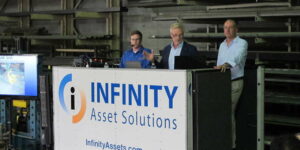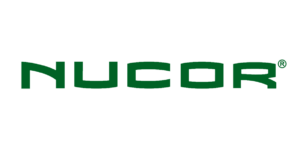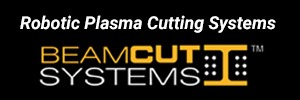WORLD'S SMALLEST AUTOMATED TUBE BENDING CELL
A radically new automated tube bending cell has been developed by Unison. It provides a complete end-to-end loading/end-forming/bending and vision inspection process in the footprint typically required for a standalone tube-bending machine. Called Uni-vercell, its innovative, all-electric machine architecture centered on an articulated robot arm breaks new ground in terms of performance and compactness.
Posted: April 17, 2008
A radically new automated tube bending cell has been developed by Unison. It provides a complete end-to-end loading/end-forming/bending and vision inspection process in the footprint typically required for a standalone tube-bending machine. Called Uni-vercell, its innovative, all-electric machine architecture centered on an articulated robot arm breaks new ground in terms of performance and compactness.
Priced to compete with standalone tube benders, Uni-vercell fabricates tubular parts with diameters up to 3/4 in (16 mm), and sits in a footprint of just 48 sq ft (4.5 sq m). The machine includes a tube loader, 6-axis robotic arm with a 13.23 lb (6 kg) payload, 2-stage end-former, a multi-stack mandrel-less tube bender, and vision system.
The integrated vision system allows the cell to operate unmanned with 100 percent inspection of bend angles and end form shapes. The programmability of the system also makes it easy to integrate further functions such as product labeling, which can easily be fitted into the extensive free vertical space.
Unison is well known as the pioneer of all-electric servomotor-controlled tube benders that provide substantial set-up, repeatability and scrap reduction advantages compared with traditional hydraulic-powered machines, and have become the de facto choice for most new machine purchases for smaller tube diameters up to 6 in (150 mm). The same architectural principles are exploited in this new machine, which features a software-centric architecture that gives unprecedented control over tube part fabrication.
Two major innovations are at the heart of Uni-vercell. The first is the replacement of a tube bender's carriage with an articulated robotic arm. By adapting the arm with a simple collet for gripping and rotating the tubular part, the arm is able to hold and manipulate the part continuously from pick up, through end forming, tube bending and inspection stages, to final release. This eliminates the cost of the carriage and the large space required for the carriage bed, as well as numerous intervening reference points, jigs and handling equipment that might normally be required when building a cell from discrete components.
The second major innovation is the development of an all-electric end former, to provide software-controlled, two-stage end forming (flaring and compressing). Compared with conventional hydraulic end formers, this approach eliminates the pump and tubing – and the associated heat, noise, energy consumption and environmental issues.
Uni-vercell delivers remarkable performance. It can fabricate parts to an overall accuracy of 0.1 mm. Although the cell is optimized for repetitive volume applications, the flexibility of the robot arm allows it to be configured easily for batch production as well. Accuracy and repeatability are assured, because of the system's use of closed-loop electronic control. The drift-free performance offered also means that the machine can be instantly set up to fabricate parts just by loading a program, rather than making and scrapping trial parts until the configuration is right.
The new cell is designed for continuous use and can easily fabricate thousands of parts a day. With a typical energy consumption of around 1.5 kW (measured using an example part with three bends and one end form, including stacking at the end of the process, and 100 percent inspection,) daily electricity running costs are around $10.
The software-controlled nature of the machine delivers many further technical advantages, including much greater control over the bending process. Fine adjustments to torque levels or movement profiles can be made, for example, to optimize bend quality. Complicated shapes that might be difficult to make on a conventional hydraulic machine can also be produced easily, because the machine is able to make intervening adjustments or moves between stages, to avoid a collision for instance. This programmability can equally be exploited to optimize cycle time – by making only the minimum movements required.
Programming the cell for an application can be achieved very rapidly thanks to Unison's powerful front-end software package, Unibend, and the friendly teaching software supplied with the robot. Programming bends and end forms requires only the input of data such as position, angle, rotation and torque, and the machine sets up automatically. All of the intervening movements required by the robot may then be programmed by simply positioning the arm manually and capturing the data.
Using these simple techniques, a complete cell program can easily be produced in less than an hour. The fabrication processes and movement-related operations are also discrete stages of a cell program, allowing modifications such as fine tuning of bending or end forming, or movement optimization to be made quickly, and without generating a new program.
Energy saving is a further major advantage of Unison's new cell, as it only consumes a significant amount of electricity during the actual bending and forming operations. No hydraulic system needs to be maintained at pressure, for either the bending or end forming tools. Typical energy consumption rate for a continuously processing cell is around 1.5 kW per hour. www.unisonltd.com










